Covey Chase Farm Promotes
Regenerative Ag Techniques
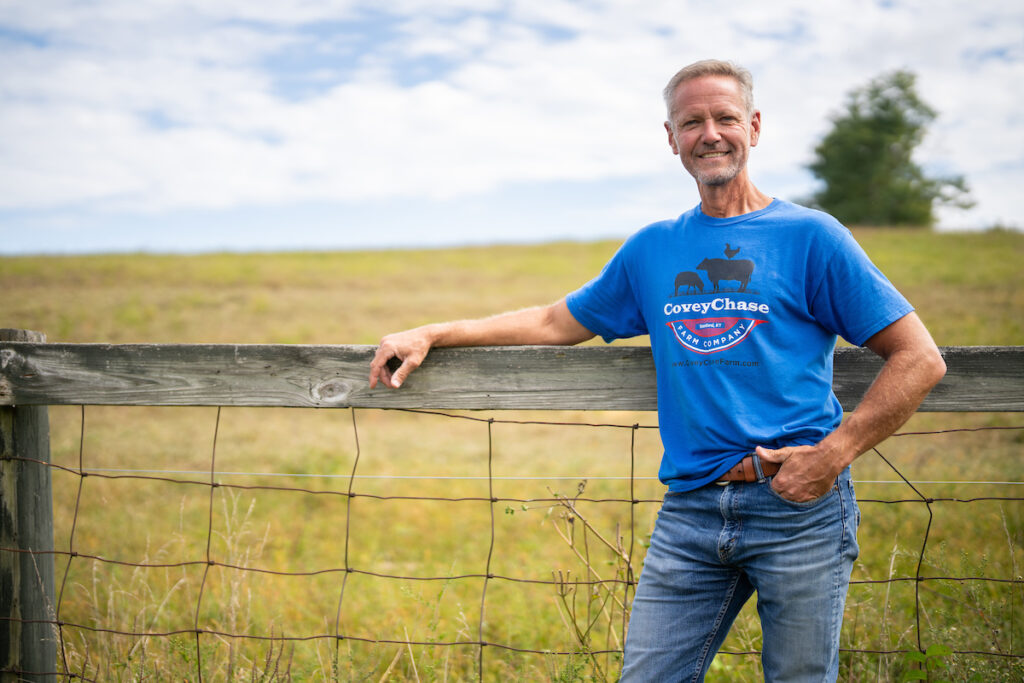
The sights and sounds of Covey Chase Farm can make you feel at home in nature.
Sam the dog lounges in a field watching chickens chase grasshoppers and geese squawking away at any aerial predators. You can hear the crickets and other natural wildlife coexisting together. This is just a normal day on the farm.
For John Davis, owner of Covey Chase, it’s a peaceful retirement from corporate life. John and his wife, Ann, both grew up in cities far from here in East Tennessee, Michigan, and Illinois. In 2001, when they were ready to leave city life behind in Chicago, they put a finger on a map and hit Stanford, KY.
They didn’t know the area or anyone in it, but they made a life here in Stanford. They built a small farm where they raised their two sons, Clayton and Connor. Two years ago, John turned 50 and retired from his corporate job in finance. He decided to focus on building his farm into a regenerative agriculture operation.
Regenerative Agriculture
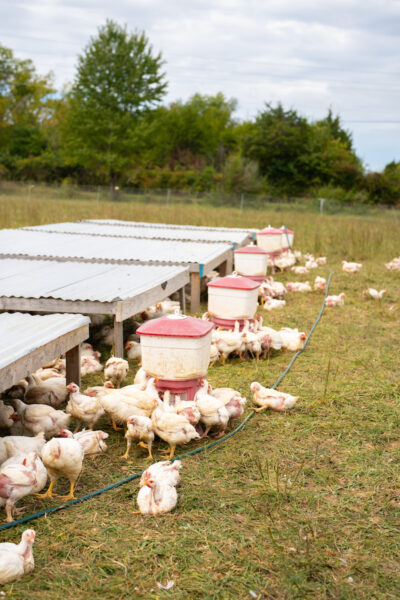
Regenerative agriculture operations are focused on using techniques that conserve and rehabilitate the land and ecosystem around it. John’s focus is on raising animals drug-free in a natural environment.
His passion is raising his animals in a healthy, clean, and open environment while supporting the local community.
“Regenerative agriculture is about being able to cohabitate with nature,” Davis said. “What you are going to see is a lot of edge. Edge is where a pasture and tree line exist together. Without that, you will not have wildlife.”
Davis is mostly known for raising chickens, which are the first thing you see when you drive up to his farm. He has them fenced in a large space so they can move freely.
Since conventional chicken farming involves cover and protection for the animals, he uses platforms for cover. He also has a guardian dog and geese to protect them from predators.
“A lot of chicken farmers use what is called a chicken tractor, which is a cage on wheels with no flooring,” Davis said. “It allows them access to the pasture, and nothing can get to them. But they can’t really roam. This is a unique setup. They have covers there for shade and places for them to roost at night.”
Also on his farm are sheep, pigs, and beef cattle, which also are able to roam freely within boundary areas.
“I’m hoping to make an impact on the land and the community,” Davis said. “The animals, in my view, live the best life they are going to live. They have freedom and live in a very free environment while providing the food that the world needs.”
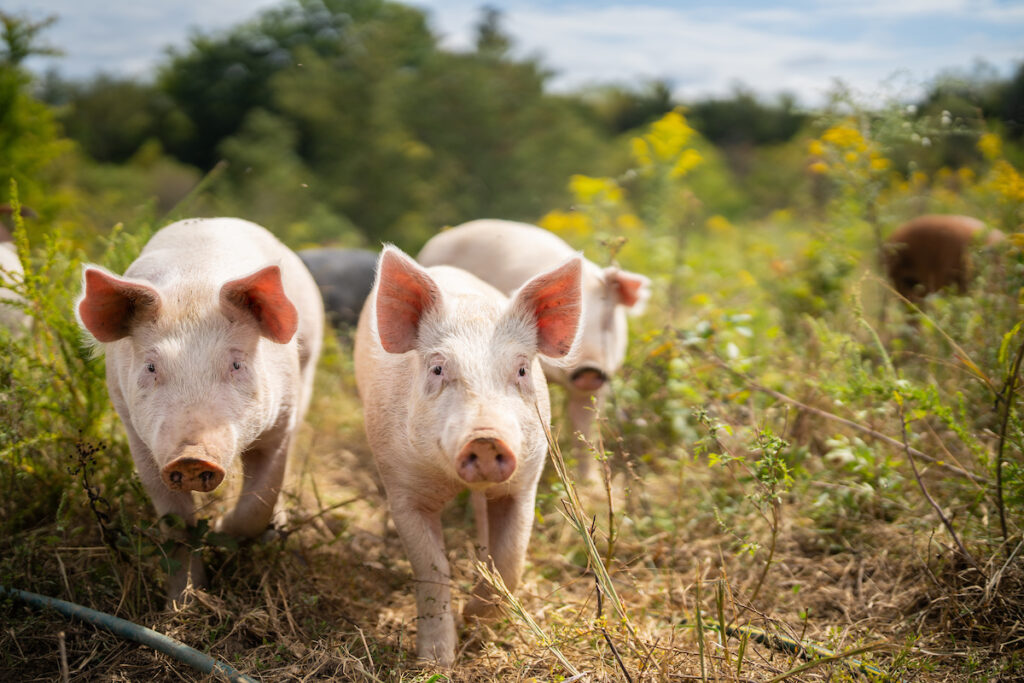
Serving the Community
Davis didn’t want just to be a hobby farmer or a homesteader; he wanted to make a difference in his community. Davis buys most of his animals locally, except for his chickens. They come from a breeder in Pennsylvania.
The pigs, sheep, and beef cattle are sourced locally. He uses local feed mills, local processors in Science Hill and Crab Orchard, and he tries to sell his produce to the local community as much as possible. Davis is also Homegrown by Heroes certified, which supports Kentucky Proud veterans and active-duty farmers.
“I wanted to farm, but I wanted to make a business out of it,” Davis said. “It’s also about being able to provide food to your community, so you go from the beginning to the end of the full profit spectrum. There’s more than one way to make farming work.”
Davis was able to apply the business ingenuity to his farm operation that he developed throughout the years he spent as a CPA.
“If I were only farming, I would be a little bit burned out because there is still a little bit of that business side of me,” Davis said.
One of the things he’s had to learn is how to market his business. He’s put his knowledge to use through social media marketing, online sales, and local farmer’s market setups. Davis likes to showcase exactly how his animals are raised so consumers know where their food is coming from.
“I believe in food transparency,” Davis said. “So, I try to show videos of how the food is being raised.”
He said part of the obstacle to selling locally is that a lot of people don’t seem to know how to find locally produced food. He enjoys educating others through marketing.
“Ultimately, as our food lines become more and more foreign-owned and monopolized, it’s important to get back to locally sourced food,” Davis said. “It’s more beneficial if you know exactly where it came from, and you know exactly how it was raised. I think we’ve become detached from where our food comes from.”
Davis also provides chicken and lamb to restaurants like Bluebird in downtown Stanford.
“Having places like the Bluebird that support local farmers is going to be paramount as we move forward,” Davis said. “It doesn’t get more local than this.”
For more information on Covey Chase Farm and Bluebird, visit bluebirdnatural.net and www.coveychasefarm.com.
Covey Chase Farm currently provides chicken and lamb produce to the Bluebird restaurant.
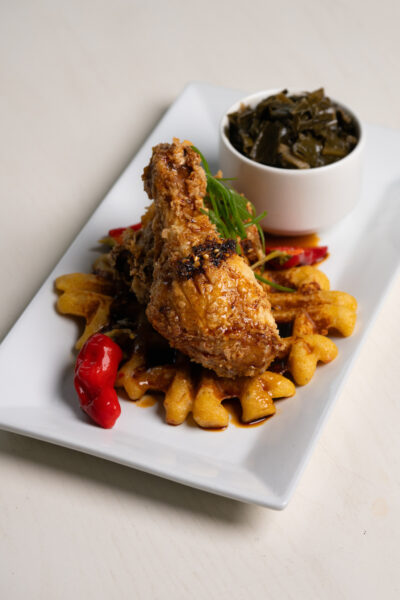
Hot Sorghum Glazed Chicken & Waffles - Fried CoveyChase Farm chicken quarter, honey jalapeño cornbread waffle, sorghum soy glaze, chili oil, scallion, braised collard greens
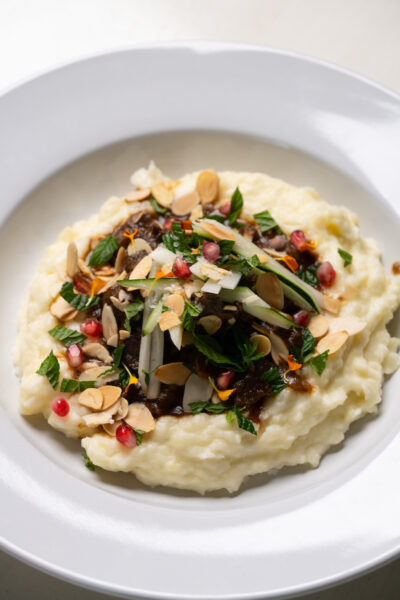
Braised Moroccan Lamb - Wine-braised CoveyChase Farm lamb, apricot, golden raisin, toasted almond, pomegranate, fresh herbs, potato purée
